The Global Health Network (TGHN) is a platform for communities of practice in specific global health fields that facilitates and enables researchers and health care professionals to work together across networks and between diseases, regions and organisations. Through these communities of practice, research outputs are amplified and the process is made easier, faster and better. The platform supports health professionals to lead research in the world’s most challenging settings and enables organizations to share best practice and know-how around the globe. If you are viewing this article on Mesh, then you are already within the network, which hosts Mesh alongside over 30 other communities of practice.
The platform is supported by a small Operations Team led by Professor Trudie Lang, Director of The Global Health Network. The team is based at the University of Oxford in the UK. Leandro Abade, TGHN’s programme manager, presented the objectives and approaches of TGHN to attendees of the 2018 Wellcome International Engagement Workshop.
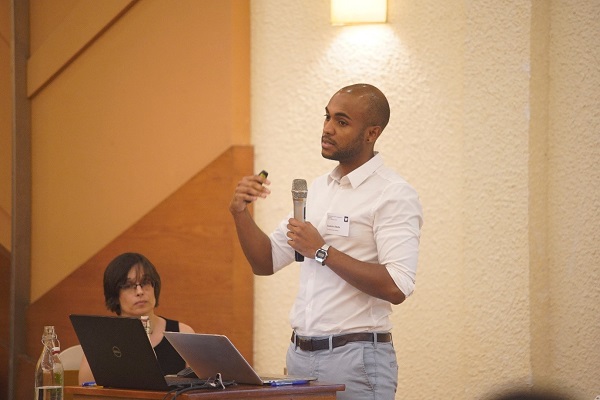
Image: Leandro Abade, TGHN programme manager, presenting at the 2018 Wellcome International Engagement Workshop | Minh Tan
The aim of TGHN is to bring people together to share expertise and knowledge, ultimately to make global health research easier, better and faster. TGHN members can share training and resources to help improve their research processes and capacities. Starting in 2011 with a single site on Global Health Trials, initiated to develop a knowledge sharing culture around clinical trials in global health, and funded by the Gates foundation, TGHN now hosts over 30 communities, where those working in specific areas of global health can network and share learning and methods.
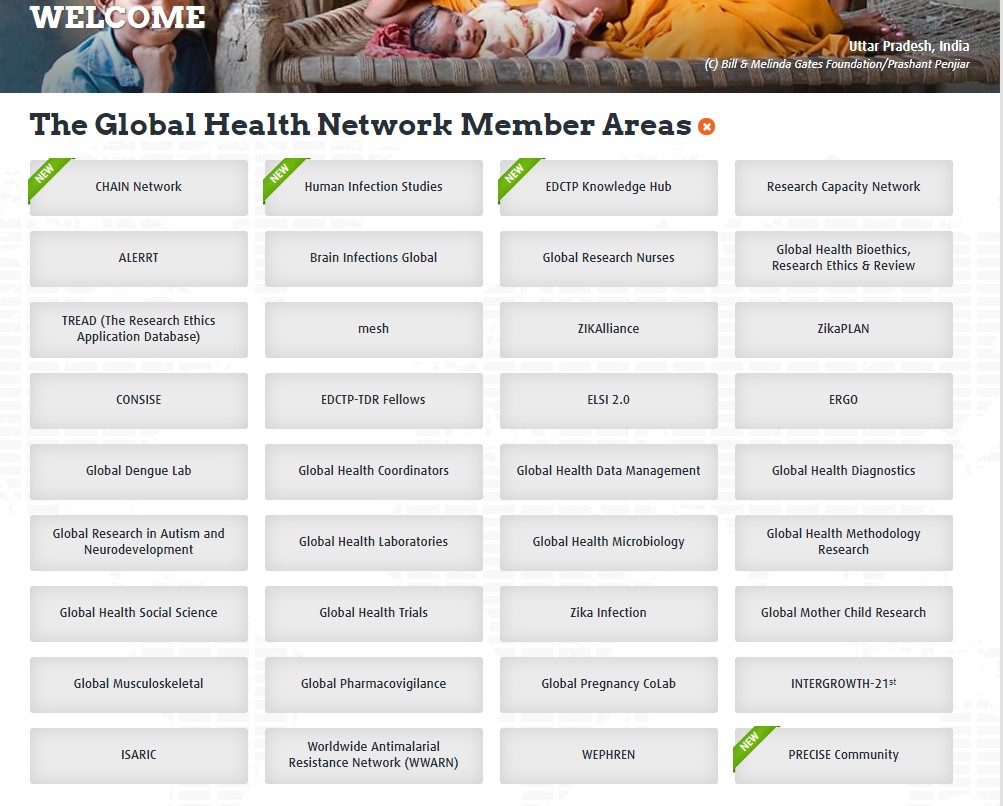
Image: The Global Health Network homepage, showing all of the current member sites | TGHN
This format allows those working in research to share materials and to meet ambassadors across different regions to feedback on these processes and outcomes via TGHN’s various resources and tools such as the ‘matchmaking’ Sitefinder. Materials hosted on TGHN include:
- Free, open access e-learning
- Guidance articles
- Tools, templates
- Live blogs and discussions with useful insights
TGHN has an extensive global presence - since 2011, researchers, nurses, technicians and scientists working in low and middle income countries (LMICs) have accessed The Global Health Network over 11 million times, with many thousands of regular users.
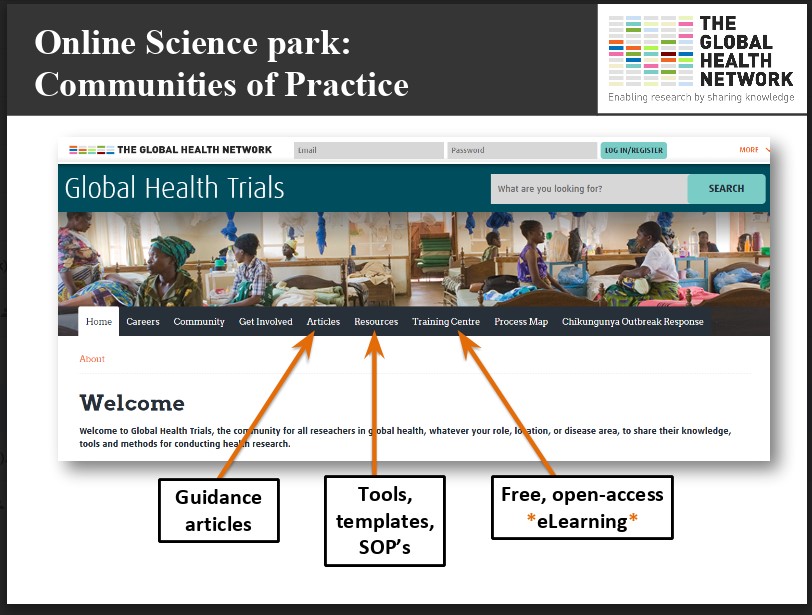
Image: Some of the resources available through TGHN | Leandro Abade.
Download Leandro's slides here (PDF).
REDe, the Research Capacity Network
One of the member areas hosted on TGHN is the Research Capacity Network, or REDe. Nina Jamieson from TGHN presented REDe to the workshop attendees. REDe is a regional network, run across the three EU-funded Zika consortia (ZIKAction, ZIKAlliance and ZikaPLAN). The aim of REDe is to develop a network of research sites and build strong partnerships between all the research sites running Zika studies in Latin America and the Caribbean so that together, a sustainable platform for research develops that has the capability to respond effectively to future outbreaks. The pages are available in multiple different languages to make them accessible to researchers across the world.
Image: Nina Jamieson from TGHN presenting REDe at the 2018 Wellcome International Engagement Workshop | Minh Tan
REDe is currently undertaking a ‘knowledge gap analysis’ (KGA) study to establish the key knowledge and skills gaps in Latin America and the Caribbean, relating to clinical and laboratory research. The aim is to determine key training needs in order to support health facilities and laboratories in running high-quality health research studies. This KGA will inform the development of a training curriculum, and mentoring schemes that can be initiated between different study sites.
The Professional Development Scheme (PDS) is an online tool and a reliable mechanism to record a researchers skillset, track career development and identify gaps in knowledge. It provides a step-by-step process to comprehensively document research experience and research competencies. The scheme can help plan staffing requirements for a study, carry out appraisals and direct training programmes. Measuring the acquisition of research competencies generates comprehensive data on the impact of capacity development, an essential requirement for conducting effective health research.
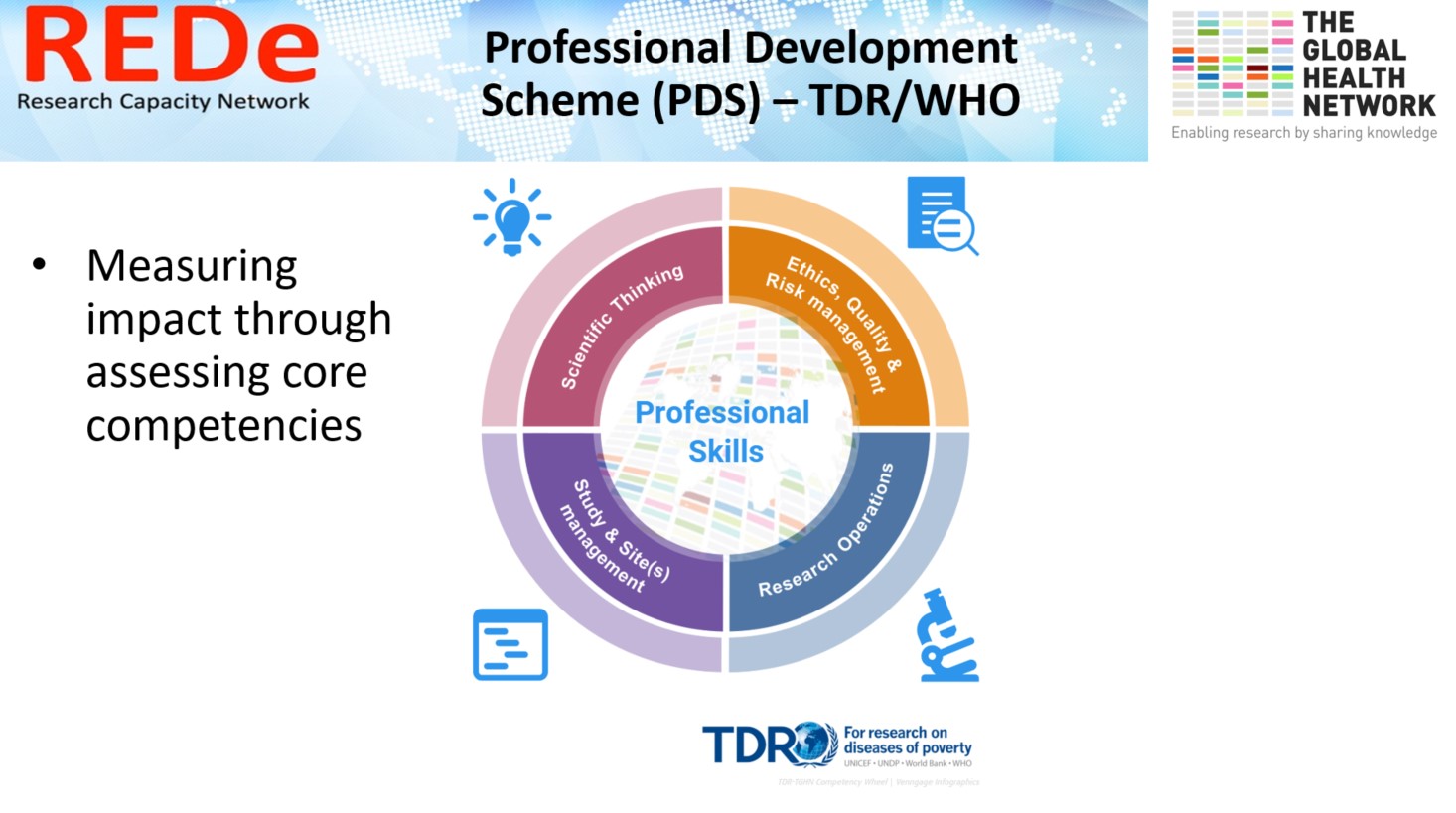
Image: Some of the resources available through REDe | Nina Jamieson.
Download Nina's slides here (PDF).
MESH
Mesh is one of TGHN’s member areas, and may be where you are reading this article. Launched in 2016, it is a network for those working in community and public engagement (CPE), especially in low- and middle-income countries. It aims to support a community of practice around community engagement, which can help generate greater capacity and leadership, and evidence to support community engagement. It is a knowledge platform with information presented in a way that is accessible to a range of stakeholders. It is not currently set up to serve communities themselves, but is instead focussed on how to incorporate expert knowledge of communities into engagement work.
Mesh includes:
- A repository of funding opportunities - which is open to contributions from the CPE community, if you know of any others!
- A list of relevant journal articles
- A repository of relevant project reports
- A repository of practical guides and tools
- A guide on project evaluation
- A map of other networks and organisations e.g. HELP, AVAC, and other places you could go.
- A list of training and funding opportunities
Currently in development is:
- A revamped matchmaking map
- A knowledge portal on engagement around epidemics
- An improved mechanism for discussion and debate
---
The content on this page forms part of the online report for the 2018 International Engagement Workshop “Taking it to the Next Level: How can we generate leadership and develop practice in engagement?". To learn more about the workshop, access the rest of the report and browse the video presentations, discussion summaries, and tools, visit the workshop page.

This work is licensed under a Creative Commons Attribution 4.0 International License.

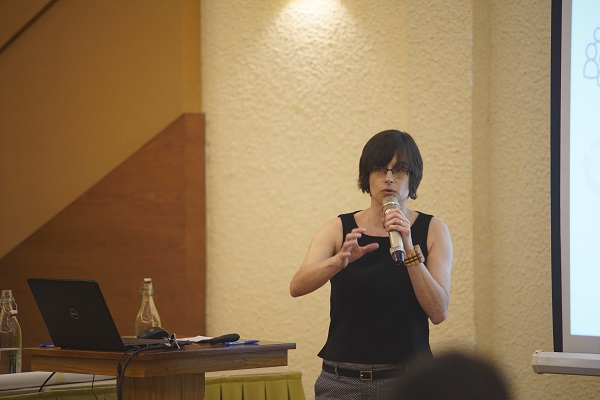
Please Sign in (or Register) to view further.